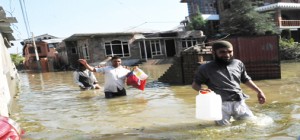Fayaz Bukhari

Srinagar, Sept 17: Sixteen bodies were recovered from worst flood hit area of Srinagar as the water level fails to recede, forcing Government to breach flood channel bank at Jawahar Nagar to de-water the area as people are becoming impatient fearing collapse of their houses.
Superintendent of Police, South, Imtiaz Parray, told Excelsior that 16 bodies were recovered from Jawahar Nagar and its adjoining area since yesterday. “13 bodies were recovered from the debris of one house in Jawahar Nagar that collapsed on September 7”, he added.
These bodies were recovered from the areas which are still submerged and water for the past few days doesn’t recede from these areas.
Locals today protested in parts of Srinagar city against Government for not de-watering their localities. They blocked roads but local elders intervened and asked them to remove the blockade as it hampered relief work.
Mohammad Sadiq, a local resident said: “Why is not Government de-watering our areas? You can see water is not receding from our areas. You can see carcasses of cows and dogs flowing everywhere. This can lead to spread of diseases.”
People in the Tengpora, Batamaloo, Qamarwari and Bemina came out on streets against Government’s failure to dewater their areas and conduct rescue and relief.
“We didn’t see any official since floods inundated our areas. Where is the Government? They have moved their families to Jammu and Delhi and left us in flood waters,” said Irfan Ahmad, resident of Bemina.
The protests hampered the relief operations by the locals and NDRF. “We are trying our best to reach everywhere, but there are difficulties. We cannot be everywhere at the same time”, said one of the officers of NDRF.
As the people are running out of patience regarding safety of their houses, Government this evening breached the flood channel bank of Jawahar Nagar to dewater the area.
The water has now started flowing into flood channel and people are expecting that the water level will recede now more quickly as compared to past two days when water pumps were used to de-water the areas.
The de-watering of the area that was started two days ago was not effective as only few inches of water receded during past 48 hours despite Government using 30 pumps.
Deputy Superintending Engineer D Anjaneyulu of Oil and Natural Gas Corporation (ONGC) said that so far, the water level has decreased by nearly 15 inches in the 48 hours of operation. “It is huge area and dewatering will take time, however, breach can be more effective”, he added.
“Our houses are no longer safe as the water level is not receding. Our houses are now vulnerable. We are monitoring water levels for last three days when de-watering pumps were operated here. The level is not receding”, said Nisar Ahmad, of Gogjibagh.
“Many old structures have already collapsed and many more will crumble in the coming days in Jawahar Nagar, Rajbagh, Gogjibagh and adjacent areas as water level is not receding. Those houses that have strong foundation and are plastered from in and outside will withstand the stagnant waters. The houses with column structures are safe”, said Muzaffar Jan, a construction Engineer and Architect.
Jan said most of the houses in Jawahar Nagar area have been constructed between 1960 and 1970 and they are constructed in brick and mud instead of concrete. “There are large number of heritage houses that are more vulnerable”, he added.
Jan said that around 100 houses have collapsed in Rajbagh, Gogjibagh and Jawahar Nagar and its adjacent areas while other houses have developed cracks and are unsafe. He asked people to take precautionary measures while shifting to their houses once water level recedes.
In the meantime, there is chaotic relief distribution in flood-ravaged areas of Srinagar. The relief camps set up by people who were initially getting relief from people have been now directed to go to nearest Police Stations to get the food grains especially rice from Government.
Abdul Rahim Mir of Wanabal was in Police Station Saddar approached the Police Station Saddar for rice for the relief camp which the people have set up in their locality for flood victims. However, he was told to come tomorrow as there is a long list.
A police officer said there was no relief material stored in the Police Stations in his area. “What shall we distribute when we have nothing here? It is directly sent to localities where there is need”, he asked.
It may be mentioned here that the Government had directed that police stations be converted into base camps for distribution of relief material but the police officers are reluctant to do it as they fear outbreak of law and order problems. “We don’t have space to store the food grains”, said a police officer.
A large number of patients are reporting to the Medical Camps set up at various places near the relief centre. These camps were set up by local doctors who are doing voluntary work.
Dr Nisar-ul-Hassan, Physician and president of Doctors Association Kashmir (DAK) said: “We are examining 1000 patients daily in two medical camps in Kashmir University and NIT in Srinagar. Majority of the patients have viral flu and viral fever. We also get few odd cases of water borne diseases like diarrhea. We also examine patients with flood related depression.”
Dr Nisar sad there is no epidemic but cases like running nose, cough and viral rashes among the patients are common. He, however, said that there is threat of water borne disease like typhoid, cholera, hepatitis and leptospirosis.
The DAK president has asked people to maintain personal hygiene, wash hands frequently, use chlorine tablets for water, bleaching power for paths and other open spaces.

